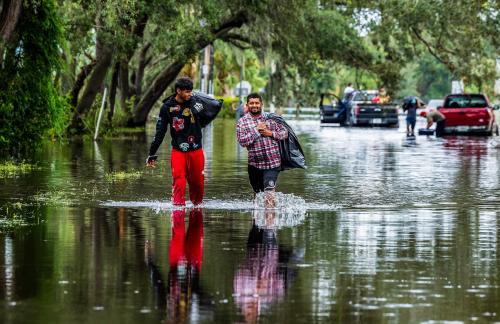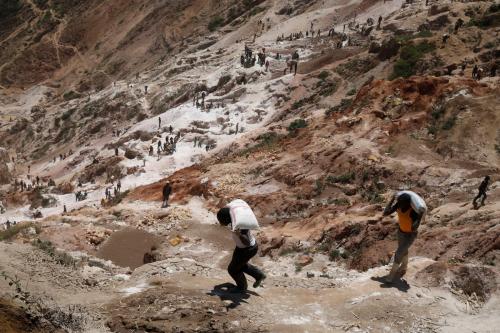

3:00 pm EDT - 4:30 pm EDT
Past Event
On May 19, the Foreign Policy program at Brookings hosted a webinar to explore how the U.S. Department of Defense (DOD) is responding to the challenges of climate change and how this is reflected in the FY23 budget request to Congress, in the National Defense Strategy, and in engagements with allies and partners. The event featured DOD officials Principal Director for Arctic and Global Resilience Greg Pollock and Senior Advisor for Climate to the Secretary of Defense and Chief Sustainability Officer Joe Bryan as well as Brookings experts Suzanne Maloney, Samantha Gross, and David Victor.
Climate change is reshaping geostrategic, operational, and tactical environments with significant implications for U.S. national security and defense. The panelists focused on the resilience of our military infrastructure and capabilities; the clean energy transition; and actions the DOD must take to continue to project American global leadership on this issue.
Pollock emphasized, “climate change is fundamentally altering the strategic context in which the joint force operates.” Sea level change in the Arctic and South China Sea impacts the ways in which the United States interacts with allies, partners, and other nations around the globe. It is vitally important to ensure climate considerations are incorporated in all of the DOD’s strategic documents and to promote climate literacy through the DOD’s professional military education institutions and elsewhere, he asserted.
Bryan viewed the impacts of climate change through the lens of supply and demand. Climate change is driving demand for mission — from humanitarian assistance and disaster relief to changes in the Arctic. And it is also impacting the military’s readiness and ability to respond to these crises; for example, the military must evacuate when wildfires hit an installation. The DOD must invest in resources to reduce these risks which are becoming increasingly commonplace.
Gross underscored the importance of investing in a greener fighting force. Innovations to eliminate fuel use or to use fuel more efficiently can be advantageous for the military and make the DOD more combat capable. Gross spent some time discussing the military’s role in securing oil supplies and the current challenges that Europe is facing because it depends on Russian oil and natural gas supply.
Victor discussed cascading climate risks and the ability of climate change to disrupt military bases and training with extreme weather events. He also spoke to the effects of climate change on fragile states and the potential for more threats, including mass migration, if local governments cannot cope with risks that climate change makes more acute, including lowered crop yields due to high heat or lack of water.
Maloney moderated the conversation and emphasized the tensions between short-term and long-term interests and demands as they relate to climate change and the actions leaders take which have the potential to reshape outcomes on the ground. She highlighted the importance of sustaining these kinds of policies and initiatives beyond the lifespan of any individual administration or secretary of defense.
Panelist


Vanessa Williamson, Ellis Chen
January 21, 2025

Tarek Ghani, Juan S. Lozano, Anouk Rigterink, Jacob N. Shapiro
March 13, 2024
2024
Online Only
Thursday, 10:30 am - 11:30 am EST